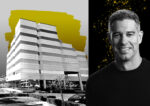Trending
TRD Forum: CRE leaders on China, DTLA, and what commercial brokers can learn from their resi brethren
“The amount of wealth the Chinese have is something that we’ve never seen before.”

“The most commonly inconvenient place to meet people in the city is Downtown,” Chris Rising of Rising Realty Partners quipped during The Real Deal’s first Los Angeles Forum Thursday. Rising joined other commercial leaders at the Bank of America Plaza in Downtown for the event, where they discussed the state of the market here, the game-changing impact of Chinese institutional capital, affordable housing and other big-ticket issues central to the industry.
Rising, whose father-and-son development business is heavily focused in the crane-filled area, said there are two, generational versions of DTLA.
“There’s the Millennial Downtown, equipped with trendy hotels and ride-sharing,” he said, “and then there’s the Generation X and Baby Boomer Downtown, which depends heavily on their car.” Downtown’s office vacancy will improve, Rising said, once public transit becomes more popular and more people see the area as a viable residential neighborhood.
In a discussion moderated by TRD LA’s editor Hannah Miet, the panelists talked about the impact of Chinese investment on the L.A. market and the potential shocks to the system if the spigot is turned off. Downtown’s largest developments — Metropolis and Oceanwide — are being constructed by Chinese developers.
“The amount of wealth the Chinese have is something that we’ve never seen before,” said Eastdil Secured’s Steve Silk, who is also a professor at USC and had a group of his own students in the audience told the crowd. Silk, who is brokering the $14 billion sale of a Blackstone logistics portfolio to China Investment Corp., said that capital controls instituted by Beijing were impacting the so-called “gray rhinos,” but not the government-backed players. These rhinos include Chinese conglomerates such as Anbang Insurance and HNA Group.
“It wasn’t helping China so those guys have all been shut down and a lot of them we thought were investing equity, but they were actually investing debt,” Silk said. China continues to put a tremendous amount of money into U.S. real estate, he added, but the money would shift into things that will benefit the Chinese economy long-term.
“They have a tremendous amount of money and they will invest the same amount as they did in 2016, but its just not as splashy,” Silk said. The upcoming elections in China may also ease the restrictions, he said.
Rising seemed unfazed by the constraints on Chinese investment in the U.S.
“There are other sources that are filling the void,” he said. “It’s not as though the Chinese left and there are no transactions happening.”
Panelists also discussed the merging of L.A.’s real estate sectors — and how commercial brokers are starting to take cues from their residential counterparts.
Recently, a change in consumer taste has led office landlords to offer luxury residential amenities, such as a concierge services, while multifamily landlords offer co-working areas, said Carl Muhlstein of JLL.
Commercial developers could learn from residential folks when advertising such properties, Muhlstein said.
“What these (residential) brokers will do for a $2 million listing with drones and staging is phenomenal, so we’ve been applying a lot of those techniques to commercial,” he said.
Beatrice Hsu of Brookfield Property Partners said renters in L.A. have raised their expectations on what comes with a property. The average client now demands a washer and dryer, parking and gym — elements that once were considered luxury amenities.
“Expectations have gotten higher,” she said.




